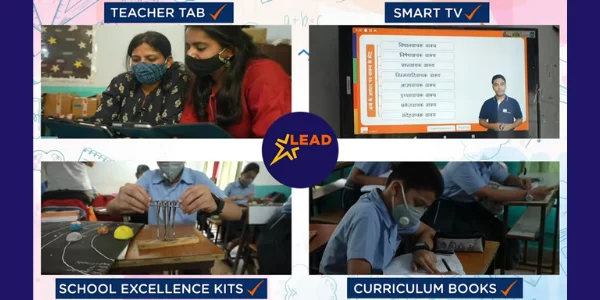How LEAD pedagogy helps develop 5 skills to succeed in life

Not too long ago, in the early 1980s, my father was the fastest typist in his class and my mother was learning Shorthand i.e. speed writing. Gen Z would be surprised to know that these were considered some of the top skills of that era. Cut to 2022, merely 30 years later, these skills are either too common or redundant. The pandemic asserted that we live in a VUCA world i.e. a world filled with volatility, uncertainty, complexity, and ambiguity. Gone are the days when one could easily enjoy the perks of a “stable” job for an entire lifetime through fancy degrees or contacts. In this time and age where technology is constantly updated, it has become essential to upskill oneself regularly in order to stay relevant.
The question that arises for most parents would then be if their children are learning essential skills that would be relevant even when they grow older. At LEAD Powered Schools, we strive to help you achieve that. Here are the top 5 skills that students at LEAD Powered Schools learn:
Collaboration
When you step inside the classroom of a LEAD Powered School, you will witness students engrossed in a discussion, role-play or other group activities. Every lesson is planned in such a manner that students get a chance to learn with each other. This forms an essential part of the day plan where students not only get a chance to demonstrate their learning but also learn to collaborate with each other. During the group practice, students may work together on a problem or engage in an activity. Irrespective of the task at hand, it is clear that this collaboration will stay as a lifelong learning experience that will help them stay relevant even in changing times.
Technical skills
Students learn computer and coding skills (CCS) at LEAD Powered Schools which makes them well versed with technology. They get a chance to build their own games, apps, and websites. This enables them to befriend technology and not get intimidated by it. There is no doubt about the importance of technical skills in the 21st century. When students become digitally literate, they get the confidence to not only adapt faster to technological changes but also lead these changes in the future.
Communication
One of the most important stakeholders in a child’s education is the parent. In the following interview, we witness a proud father admitting how his daughter has become a better communicator after joining a LEAD Powered School. Communication skills are developed through LEAD’s integrated curriculum that has the right balance of listening, reading, speaking, and writing lessons. Students also get access and exposure to various opportunities like the LEAD Championships that help them improve their communication skills. Even in these changing times, an excellent communicator will always have an edge and will be able to stand out in the crowd.
Problem-solving
Math is full of numerical problems and most students fear the subject. This is because, in the majority of the classrooms, math is taught at an abstract level where students have to imagine the concepts. However, in our classrooms, the pedagogy implemented for math is different. Teachers follow the Concrete-Pictorial-Abstract method where students interact with physical aids via school kits and pictorial aids via smart TV in the classroom to familiarize themselves with the new concept. Only after this familiarization, do they move on to the abstract level to solve the problems. This makes math engaging and solving problems becomes fun. In the long run, a logical, step-by-step approach would go a long way in solving challenging problems at the workplace or in any other setting.
Creativity
At LEAD Powered Schools, students are engaged in project-based learning. The pedagogy incorporates the learning-by-doing method to give students a hands-on experience. Through this method, when students are engaged in individual or group projects, they think outside the box. They approach the same concept with a different perspective. In the 21st century, creative thinking is required to navigate the rapidly changing world, and nurturing creativity at a young age gives our students an added advantage.


